Page 1 of 1
Z. furfuracea croaking!
Posted: Thu Jan 15, 2009 8:58 am
by lucky1
Think I'll give up on this little guy.
Had it for two years, grows one tiny leaf a year.
Now three leaves are crunchy, something's obviously going on
(Duh! ... like DEATH).
Yet my Z.vasquezii and Z. picta are doing great.
It drives me
crazy when one plant croaks, and the other 100 are fine

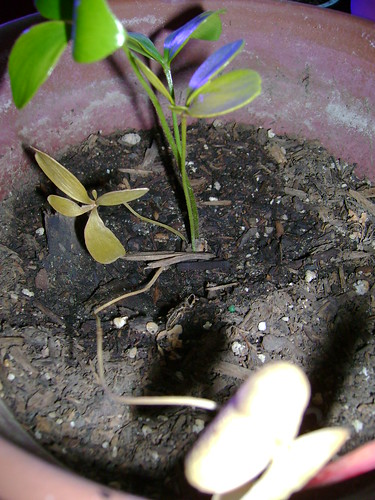
Barb
Posted: Thu Jan 15, 2009 10:02 am
by lucky1
Glad I repotted today.
The roots were dry as a bone in the unglazed clay pot.


Are these little knobs, nodules supposed to be on there?


It's got a long ways to go to become as beautiful as this...(Earth Wind & Fire pic).
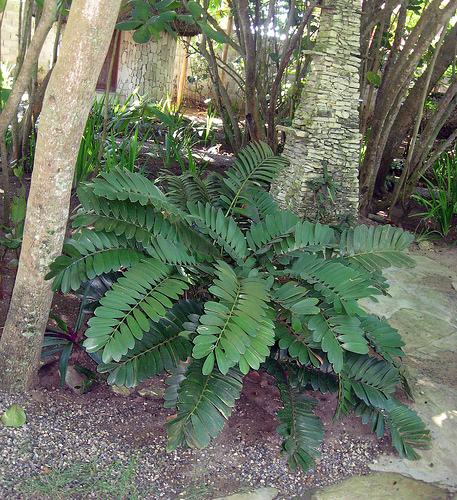
Barb
Posted: Thu Jan 15, 2009 3:29 pm
by virtualpalm
lucky1 wrote:Glad I repotted today.
The roots were dry as a bone in the unglazed clay pot.

I am not surprised by this, Barb. That is a typical response to drying out. The plant looks quite healthy. I think it will be OK.
lucky1 wrote:Are these little knobs, nodules supposed to be on there?
Yes, those little knobs are actually small, immature corraloid roots... which indicates an otherwise healthy plant.
Jody
Posted: Thu Jan 15, 2009 3:55 pm
by lucky1
Jody,
I guess I
overdid keeping it dry (you probably recall the Sago last year

).
Always have trouble with unglazed clay pots; gonna stop using them.
Those "knobs" corraloid roots are for nitrogen fixing?
Does that occur even in winter indoors?
Thanks a lot!
Barb
Posted: Fri Jan 16, 2009 4:01 am
by virtualpalm
lucky1 wrote:Those "knobs" corraloid roots are for nitrogen fixing?
Does that occur even in winter indoors?
If the corraloid roots are populated with cyanobacteria, then they are able to fix nitrogen from the air even in winter indoors. If you are really curious, you may want to carefully remove one of those "knobs" and cut it open to see if there is a bluish-green ring around the inside of the "knob" -- which would indicate that the cyanobacteria have been able to get in there.
Jody
Posted: Fri Jan 16, 2009 9:13 am
by lucky1
Jody,
I am curious but think I should give the little guy a few days rest in a warm spot before I dig him up again for the surgery. Those nodules are tiny.
Are corraloid roots what miccorhizae cling to as part of a symbiotic relationship?
This is interesting stuff, Jody, thanks for taking the time to explain it.
Barb
Posted: Sat Jan 17, 2009 5:57 am
by virtualpalm
lucky1 wrote:Are corraloid roots what miccorhizae cling to as part of a symbiotic relationship?
No. Mycorrhizae attach themselves to the regular fine roots and increase the plant's ability to take in water and nutrients. They are not involved in the corraloid roots.
BTW, for anyone interested in corraloid roots, I have a couple photos to share. My wife and I started painting the outside of our house over the holidays. To access one side, we had to tie back our big
E. ferox (see first photo below). Underneath this plant, I found clusters of corraloid roots -- some quite large -- at the surface. I just went out and photographed the largest cluster (see second photo below). I also removed a small portion of it and cut into one of the nodules to reveal the blue-green cyanobacteria inside (see third photo below).
Enjoy!
Jody



Posted: Sat Jan 17, 2009 2:47 pm
by lucky1
That
is interesting, Jody!
Looks like a cluster of bees around a comb.
I read a little more about corraloid roots;
they apparently grow
up towards the surface of soil.
Are they coming up to look for algae, which presumably is food for the plant?
Is blue-green cyanobacteria algae, or does it need algae?
So the regular roots that grow downward serve only a partial purpose in feeding the plant?
or maybe just stabilizing it in the soil?
Or am I way off base
again?

Huge E.ferox, gorgeous!
Barb
Posted: Sun Jan 18, 2009 11:16 am
by Knnn
Great post, photos & info

Thanks!
Steve
furfuracea getting worse
Posted: Mon Jan 19, 2009 1:30 pm
by lucky1
Maybe it just didn't like the new Light Box I installed after Christmas.
It's getting worse despite being kept warm, and now, moist.
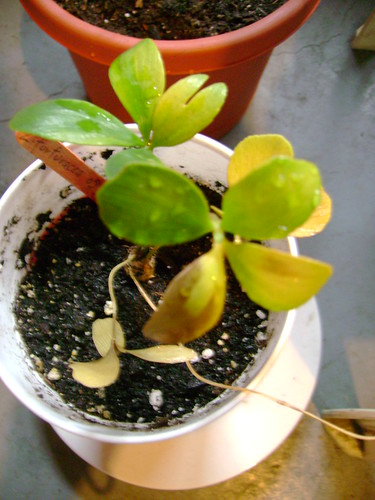
Just for interest, I repotted the Zamia picta, and noticed it had no corraloid roots.
But the caudex seems to have grown considerably.
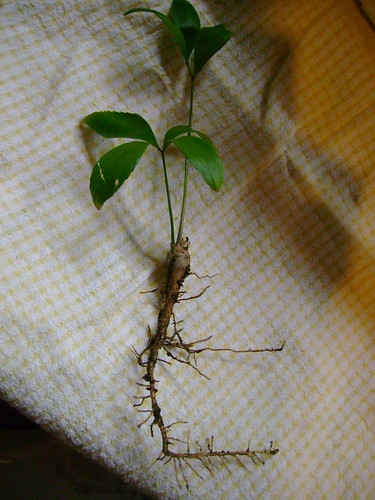
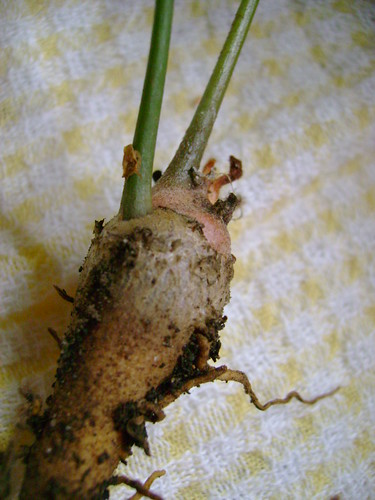
Barb
Posted: Wed Jan 21, 2009 4:15 am
by virtualpalm
lucky1 wrote:That is interesting, Jody!
Looks like a cluster of bees around a comb.
I read a little more about corraloid roots;
they apparently grow up towards the surface of soil.
Are they coming up to look for algae, which presumably is food for the plant?
Is blue-green cyanobacteria algae, or does it need algae?
So the regular roots that grow downward serve only a partial purpose in feeding the plant?
or maybe just stabilizing it in the soil?
Or am I way off base again?
Lots of questions, Barb. It is presumed that the corraloid roots grow toward the surface to gain access to both cycanobacteria (which is the more formal name for blue-green algae) and free nitrogen in the air. The plant is not feeding off the cyanobacteria; rather, it simply obtains the converted form of nitrogen (most likely nitrate) from its symbionts (the cyanobacteria in the nodules of the corraloid roots). The other, "normal" roots function to both secure the plant in the soil and take up water and other nutrients from the soil. Hope this helps.
Jody
Posted: Wed Jan 21, 2009 9:09 am
by lucky1
One more question.
Sorry!
Would corraloid roots be absent/unnecessary if fertilizers were consistently used (supplying nitrogen/nitrates)?
Thanks for this!
Barb
Posted: Wed Jan 21, 2009 6:18 pm
by virtualpalm
lucky1 wrote:One more question.
Sorry!
Would corraloid roots be absent/unnecessary if fertilizers were consistently used (supplying nitrogen/nitrates)?
Thanks for this!
Barb
It depends on the quality of the soil, the pH, etc., but in general coraloid roots would be unnecessary if the nutrition of the soil is good. But that doesn't necessarily mean that they will be absent. The plants seem to always grow some amount of coraloid roots regardless of their growing conditions. I have no idea why they do this. Perhaps it is as a result of millions of years of evolution in seasonally variable climates and soil nutrient levels.
Jody
Posted: Wed Jan 21, 2009 8:30 pm
by lucky1
I've learned a lot from this.
Thanks, Jody.
Barb
Posted: Tue May 12, 2009 10:07 pm
by Lori
I have noticed that some species consistently display a greater proportion of coralloid roots than other species. Macrozamia communis, for example. See photos attached, which are of two-year-old seedlings.
![Image]()

[/img]
Posted: Wed May 13, 2009 4:39 pm
by lucky1
Great pic Lori, nice to hear from you!
I just repotted my little furfuracea with better soil.
Thank goodness it recovered from its near fatal dieback this winter.

Thanks!
Barb
Posted: Sun Jan 17, 2010 11:40 am
by Gartem
It's my zamia furfuracea. It 2 years old.

Posted: Sun Jan 17, 2010 5:17 pm
by lucky1
You're certainly doing many thing correctly, Gartem!
Mine is older than yours

Barb
Posted: Wed Feb 24, 2010 7:52 am
by Gartem
Hi everyone.
Yesterday I transplanted Zamia furfuracea. Here I want to share with you photos.


Posted: Sun Apr 25, 2010 4:09 am
by Gartem
Posted: Mon Jun 28, 2010 2:42 am
by Gartem
Zamia furfuracea






















